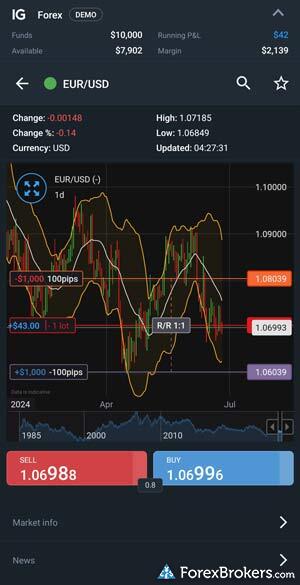Winners Summary
Best US forex broker - tastyfx
| Company |
Overall |
 tastyfx tastyfx
|
 |
Why tastyfx is the best overall: tastyfx is the best overall forex broker for U.S. traders due to its extensive range of tradable products, including 91 forex pairs and multi-asset CFDs. With competitive pricing, comprehensive research tools, and strong regulatory oversight, it offers both beginner and professional traders a powerful platform for forex trading across global markets.
tastyfx is a tough one to beat in my book for forex trading in the US. Forex and CFD traders looking to trade a large number of instruments across multiple asset classes, including exchange-traded securities on international exchanges, will find that tastyfx offers an extensive range of tradable products on its platforms.
- Total forex pairs offered: 91
- Likes: Comprehensive research tools and real-time exchange data; broad range of markets, currency pairs, and multi asset CFDs (including cryptocurrencies); licensed in major regulatory jurisdictions; competitive commission-based pricing and spreads on forex.
- Dislikes: Web platform trading windows must be resized manually to keep the layout organized; Forex Direct only available to professional traders within EU.
- Read a full tastyfx review on our sister site, ForexBrokers.com.
Best for ease of use - FOREX.com
| Company |
Overall |
 FOREX.com FOREX.com
|
 |
Why FOREX.com is best for ease of use: FOREX.com excels in ease of use with its well-designed, intuitive platforms that make trading simple for users at any level. From its fluid mobile app to its Advanced Trading platform, I found that managing positions, executing trades, and navigating research tools are all straightforward, thanks to a clean interface and features like customizable watchlists, real-time data, and integrated market updates.
With a full range of features, diverse trading tools, and comprehensive research, FOREX.com caters to traders of all experience levels.
- Total forex pairs offered: 84
- Likes: Licensed in highly regulated jurisdictions; advanced charting capabilities in both desktop and web platforms; platforms feature numerous channels of research content and trading ideas; offers cryptocurrency CFDs in the U.K., and bitcoin futures in the U.S.
- Dislikes: Average spreads are higher than at some low-cost brokers; ceased business of regulated activities in Hong Kong.
- Read a full FOREX.com forex review on our sister site, ForexBrokers.com.
Best for professionals - Interactive Brokers
Why Interactive Brokers is best for professionals: Interactive Brokers is best for professional traders due to its extensive global market access, competitive fees, and advanced trading tools tailored for high-volume and institutional investors.
With a vast range of assets and markets, including 115 forex pairs and professional-grade platforms, IBKR is designed to meet the needs of experienced traders who require sophisticated tools and low-cost execution across multiple asset classes.
IMPORTANT: To trade forex with Interactive Brokers in the United States, you must be classified as an Eligible Contract Participant, or ECP. An ECP is generally an individual or organization with assets of over $10 million, or $5 million if trades are hedging.
- Total forex pairs offered: 115
- Likes: Regulated in major jurisdictions and publicly traded; extensive range of global markets and asset classes; bitcoin futures trading supported; competitive fees and discounts for high-volume traders.
- Dislikes: Retail spot forex only offered to non-U.S. clients; desktop platform too complex for inexperienced traders; web platform lacks forex charts; monthly minimum activity charges.
- Read a full Interactive Brokers forex review on our sister site, ForexBrokers.com.
Substantial multi-asset offering - Charles Schwab
Why Charles Schwab is best for a substantial multi-asset offering: Charles Schwab includes a wide range of securities like stocks, ETFs, options, futures, forex, and bonds. Following its integration with TD Ameritrade, Schwab now offers forex trading via the phenomenal thinkorswim platform, delivering powerful charting, algorithmic trading, and access to international exchanges in over 30 countries.
This combination of comprehensive asset classes, cutting-edge tools, and the security of a highly trusted institution makes Charles Schwab a standout choice for multi-asset traders. Forex trading at Schwab in particular is appealing due to its sophisticated platform offering, competitive spreads, quality of support, and the safety of dealing with an established brokerage that holds trillions in assets.
- Total forex pairs offered: 73
- Likes: Services available under one universal login for all accounts; access to international exchanges in at least thirty countries; highly resourceful and knowledgeable staff; high-quality content about investing and trading; powerful charting and analysis capabilities, hundreds of indicators, and algo trading via thinkScripts.
- Dislikes: Certain website and platform features are not available for forex trading; forex-related resources are exclusive to thinkorswim and unavailable on Schwab’s standard web platform; trading signals are not available at Schwab.
- Read a full Charles Schwab forex review on our sister site, ForexBrokers.com.
FAQs
Is forex trading legal in the United States?
Yes, forex trading is legal in the USA. Forex trading is regulated in the U.S. by the Commodity Futures Trading Commission, or CFTC, and requires that trading is conducted with brokers that are registered with the organization as a Forex Dealer Member (FDM) and as a Futures Commission Merchant (FCM). As part of this registration requirement, U.S. forex brokers must maintain membership status with the National Futures Association (NFA), which is the designated self-regulatory organization, or SRO. Brokers must abide by membership regulations enforced by the NFA.
In addition, U.S. regulations require that brokers maintain a net capital requirement of at least $20 million in order to be registered as an FDM in order to offer retail spot foreign exchange as a Retail Foreign Exchange Dealer, or RFED.
Based on the CFTC’s own data, the following brokers offer legal forex trading in the U.S.:
- tastyfx - Legally available to retail clients in the U.S.
- FOREX.com - Legally available to retail clients in the U.S.
- OANDA - Legally available to retail clients in the U.S.
- Charles Schwab - Legally available to retail clients in the U.S.
- Interactive Brokers - Legally available in the U.S., but only to institutional clients.
- Trading.com - (U.S. brand under XM Group’s parent company, Trading Point) - Legally available to retail clients in the U.S.
What are some tips to get started with forex trading?
Depending on your level of experience and the stage of your trading journey, the following tips may help accelerate your forex trading progress. Keep in mind that there are no shortcuts to trading successfully, and in fact, the majority of traders lose money. In speaking with thousands of traders over the years, I have found that those who are more informed typically do better than those rushing to trade without doing the proper research.
Choose a regulated broker: The first step to getting started with forex trading is to choose a broker that is properly licensed and regulated in a trusted jurisdiction, such as the U.S.; your country of residence may also affect which brokers you can choose.
Seek out educational materials: Most regulated brokers provide plenty of free, good-quality educational content to help new investors and traders learn about financial markets. There are also third-party providers with educational resources that you can access freely; one of my favorites is BabyPips.
Set up a free demo account: Nearly all regulated forex brokers offer a free demo account so you can learn how the trading software works without depositing money. The key is to use the demo account solely to learn the software, and not for judging your trading performance — that’s because you may treat demo funds differently than real funds.
Set up a small live account: Start with an amount of risk capital that you can afford to lose. The idea here is to judge your trading on a percentage gain basis, and not on how much money you're making or losing. If you can tweak your trading strategy to produce consistent results, then you can consider scaling your trading capital by depositing more money, always using funds you can afford to lose.
Learn to analyze market news and research: The best brokers provide plenty of research content and trading tools to analyze the market for opportunities, as well as streaming news headlines with fundamental and technical analysis on market prices. Learning how to analyze this information can help you decide which trading opportunities to act upon and which to skip, in addition to finding opportunities on your own.
For even more detailed tips on how to begin trading forex, check out my wide range of educational guides on our sister site ForexBrokers.com.
How do I check if a broker is regulated?
To verify a forex broker’s regulatory status in the U.S., use the BASIC (Background Status Information Center) tool of the National Futures Association (NFA), which also verifies registration status with the Commodity Futures Trading Commission (CFTC). Scams are unfortunately prevalent in the world of forex trading, so verifying that a broker is well-regulated is crucial.
What time does the forex market open in the United States?
While some forex brokers may enable early-hour trading before the trading week starts, generally the market opens globally at 5 p.m. Eastern Time on Sunday — despite banks still being closed in the U.S. — as it is already Monday in the Asia Pacific, which covers major markets like Tokyo, Singapore and Australia. The forex markets are then open 24 hours a day until just before 5 p.m. Friday to prevent rollover (there may be exceptions for some U.S. holidays).
There are times when trading may be halted, such as for certain futures products, and some brokers may close trading for all instruments each day, such as from 4:59 p.m. until 5:05 p.m., during rollover time. Conversely, some markets may trade even during the weekend, such as cryptocurrencies, depending on the broker you are using. Bottom line: It's always wise to check the trading hours for the markets you want to trade.
scheduleThe forex market's hours
If you want to learn everything there is to know about when the global forex market opens and closes (and about the best times to trade), check out the Forex Market Hours guide at our sister site, ForexBrokers.com.
What is the best forex broker in the U.S.?
tastyfx is my pick for the best forex broker for US forex traders in 2025. tastyfx, IG's brand for US forex traders, consistently ranks in first place or near the top of nearly every category we track, including investment options, commissions & fees, trading platforms, mobile apps, research, and education. Regulated by the CFTC and a member of the NFA, tastyfx's parent company (IG) is also publicly traded and holds more regulatory licenses around the world than any of the 60+ forex brokers reviewed on our sister site, ForexBrokers.com.
Check out a gallery of screenshots from tastyfx's trading platforms, taken during the product testing on our sister site, ForexBrokers.com.
What is the best forex broker for beginners in the United States?
For beginners in the U.S., I recommend tastyfx, powered by IG, as one of the best forex brokers to start with. I’ve found that it offers a seamless trading experience, leveraging IG’s trusted and regulated platform. tastyfx provides the same user-friendly web, mobile, and desktop platforms as IG, and new traders can tap into IG’s award-winning educational resources, which I’ve personally reviewed and rated highly. Although the full IG Academy isn’t directly available on tastyfx, U.S. traders can still access it via IG’s global site. With regulation in eight Tier-1 jurisdictions and a strong reputation for reliability, I believe tastyfx is an excellent choice for beginners looking for a safe and easy-to-use platform to start forex trading.
What US forex brokers offer MetaTrader?
Among U.S. forex brokers registered with the CFTC and regulated by the NFA, only three brokers offer MetaTrader, including OANDA, FOREX.com, and tastyfx. It’s worth noting that OANDA and FOREX.com offer the full MetaTrader suite, including Metatrader 4 (MT4) and MetaTrader 5 (MT5), while tastyfx only offers the MT4 platform.
Our testing
Why you should trust us
Steven Hatzakis is a well-known finance writer, with 25+ years of experience in the foreign exchange and financial markets. He is the Global Director of Online Broker Research for Reink Media Group, leading research efforts for ForexBrokers.com since 2016. Steven is an expert writer and researcher who has published over 1,000 articles covering the foreign exchange markets and cryptocurrency industries. He has served as a registered commodity futures representative for domestic and internationally-regulated brokerages. Steven holds a Series III license in the US as a Commodity Trading Advisor (CTA).
All content on StockBrokers.com is fact-checked by our research team, and edited and published by an editor. Our ratings, rankings, and opinions are entirely our own, and the result of our extensive research and decades of collective experience covering the brokerage industry.
Ultimately, our rigorous data validation process yields an error rate of less than .1% each year, providing site visitors with quality data they can trust. Click here to learn more about how we test.
How we test
At StockBrokers.com, our online broker reviews are based on our collected quantitative data as well as the observations and qualified opinions of our expert researchers. Each year we publish tens of thousands of words of research on the best stock brokers.
Mobile testing is conducted on modern devices that run the most up-to-date operating systems available:
- For Apple, we use MacBook Pro laptops running macOS 14.5, and the iPhone XS running iOS 17.6.
- For Android, we use the Samsung Galaxy S9+ and Samsung Galaxy S20 Ultra devices running Android OS 14.
All websites and web-based platforms are tested using the latest version of the Google Chrome browser.
Our researchers thoroughly test a wide range of key features, such as the availability and quality of watch lists, mobile charting, real-time and streaming quotes, and educational resources – among other important variables. We also evaluate the overall design of the mobile experience, and look for a fluid user experience moving between mobile and desktop platforms. Learn more about StockBrokers.com.

























